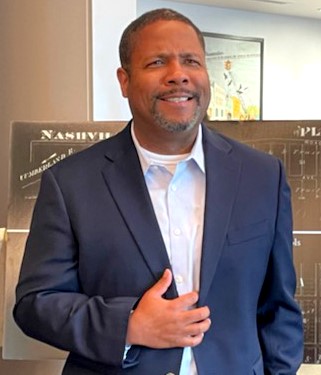Vanderbilt professor H. Richard Milner IV will become president of the American Educational Research Association this month when the organization meets in San Diego. Milner, Vanderbilt’s first elected president of AERA, is a researcher, scholar and leader of urban education and teacher education. He holds the title Cornelius Vanderbilt Distinguished Professor of Education and was named president-elect of AERA in 2021.
Milner, who was the first Black person to earn tenure and promotion at Vanderbilt Peabody College of education and human development, also is the founding director of the Initiative for Race Research and Justice at Vanderbilt. He is a fellow of the American Educational Research Association and was elected to the National Academy of Education in March 2021.

“I am thrilled to have the opportunity to play a role in the direction of education research during these especially serious times,” Milner said. “Education research is too often absent from, underrepresented, misinterpreted, under-nuanced and decontextualized in broader societal and public conversations about educational issues. To improve the human condition, we have a chance to influence policies and practices.”
Milner’s scholarship has made significant contributions to the field of education and beyond. Milner is most well-known for a Researcher Positionality Framework he developed to support researchers as they design programs of research that recognize, name and work through what he describes as dangers “seen, unseen and unforeseen.” The framework has been adopted across disciplines including sociology, psychology, nursing and health sciences, as well as anthropology.
In addition, Milner advanced empirical studies focused on opportunity gaps instead of achievement gaps. He conceptualized and introduced an Opportunity Gap Framework that researchers use to explain policies and practices, while practitioners draw from the framework to help in organizing and implementing curriculum, assessment and instructional practices.
As editor of the journal Urban Education, Milner’s research and leadership have led to stronger definitional work of urban education. With colleagues, he co-designed a survey, the Teachers Race Talk Survey, which is a tool used to examine educators’ beliefs, mindsets and sense of preparedness to talk about race and racism with students and colleagues.
Currently, funded by the National Science Foundation, Milner is working with Initiative for Race Research and Justice Associate Director Jacob Bennett and doctoral student Bryant Best on a project focused on increasing STEM participation among those in the carceral system. They are identifying assets among those often underserved in communities, including those residing in Nashville’s 37208 ZIP code area. In addition, funded by the Spencer Foundation, with postdoctoral scholar Dena Lane-Bonds and doctoral student Laura Fittz, he is studying cross-community dialogues with high school students as they build leadership skills to engage in and discuss difficult issues.
Milner’s research has been published in top journals in education, and he has published two award-winning books: Start Where You Are But Don’t Stay There: Understanding Diversity, Opportunity Gaps and Teaching in Today’s Classrooms (Harvard Education Press, 2010, 2020) and Rac(e)ing to Class: Confronting Poverty and Race in Schools and Classrooms (Harvard Education Press, 2015).
AERA is the largest national interdisciplinary research association devoted to the scientific study of education and learning, and its meeting is the largest annual gathering of education scholars from around the world.
Approximately 75 Vanderbilt affiliated scholars, including esteemed faculty members and graduate students, will present research over the meeting’s six days. Subject areas will include teaching and teacher education, STEM education, district and school leadership, education policy, school improvement and educational equity, among others.
“We are especially excited to see one of our own, Rich Milner, as president of AERA. Rich is an innovative thinker and careful researcher who will bring a deep concern for justice to his leadership of the organization,” said Camilla P. Benbow, Patricia and Rodes Hart Dean of Education and Human Development. “And, as a leading producer of knowledge in education and human development, we are proud to share the work of our faculty and the next generation of scholars at this year’s meeting.”
Founded in 1916, AERA advances knowledge about education, encourages scholarly inquiry related to education, and promotes the use of research to improve education and serve the public good.